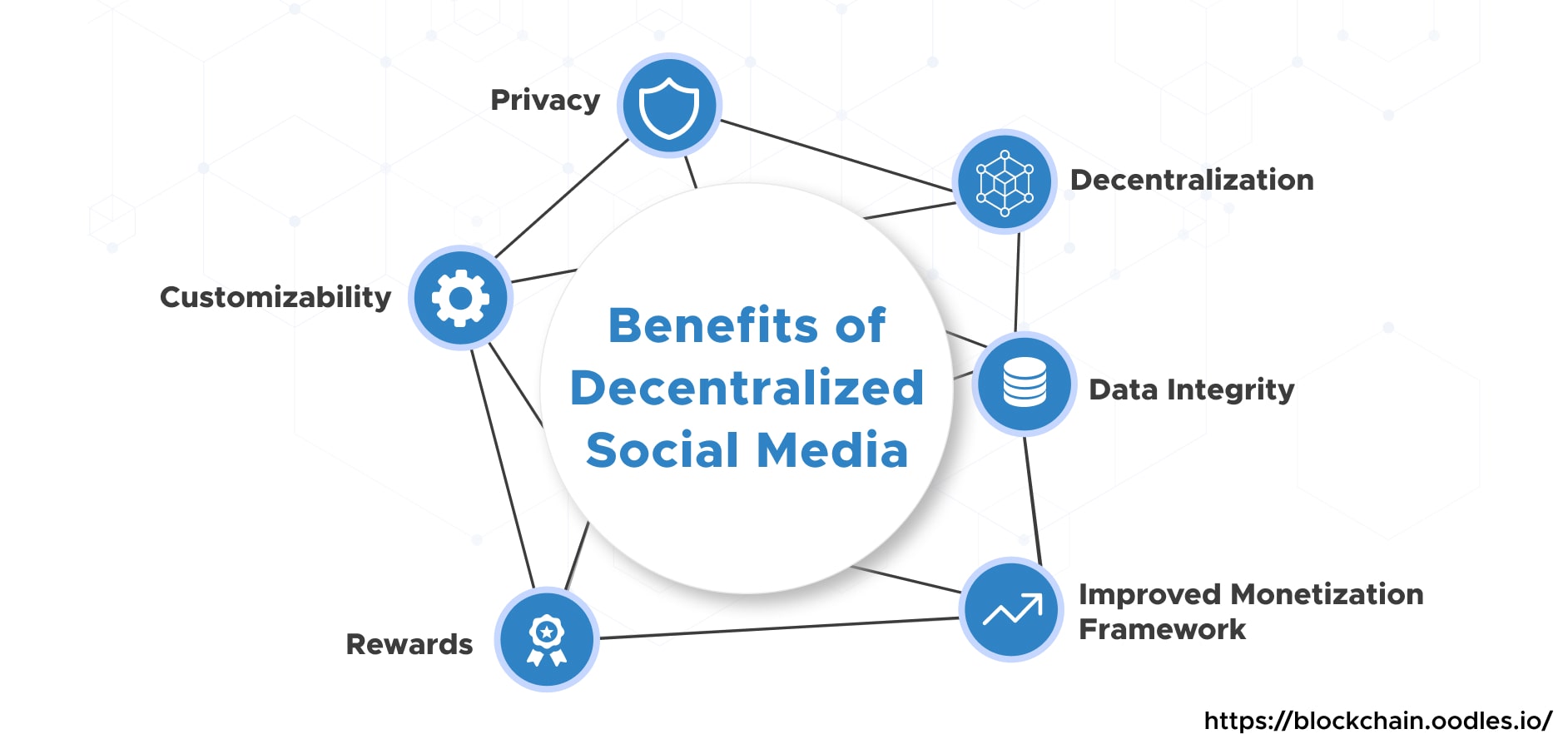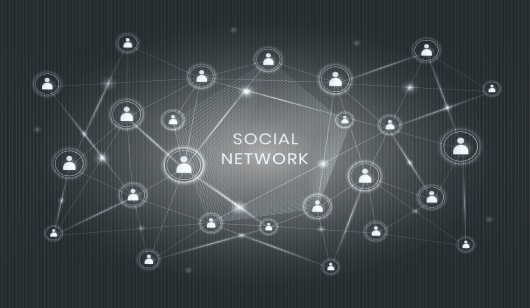-
In recent times, the surge in social media use has been remarkable. Well-known platforms like Facebook and Twitter facilitate connections among individuals. However, alongside these advantages come drawbacks such as censorship, data breaches, de-platforming, and server outages. Individuals are moving towards decentralized social media to get the core benefits of connecting and networking without compromising their privacy. Even businesses are opting for a blockchain app development company that is offering such development services. So, what is so unique about decentralized social media? Explore this in the following blog.
What is Decentralized Social Media
Decentralized social media networks are platforms on blockchain technology that enable users to share information, create content, and connect with others. These networks manage and distribute data using several independent blockchain-based servers and nodes. Operating on the blockchain makes these networks resistant to censorship and control, ensuring decentralization.
These networks often serve as alternatives to mainstream platforms like Facebook, Twitter, and LinkedIn. However, they offer distinct advantages due to their blockchain foundation, setting them apart from conventional social media.
Suggested Read | Blockchain-based Social Media Platform Development
The Working of Decentralized Social Media
Decentralized social networks function as a type of decentralized application (dApp) running on blockchain-powered smart contracts. These smart contracts serve as the backend, defining the operational logic of these applications.
Traditional social media platforms rely on centralized databases to store data. Contrarily, decentralized social networks operate on a distributed network consisting of numerous nodes globally. This design minimizes the risk of single points of failure, a vulnerability seen in incidents like Facebook's prolonged server outage.
Utilizing technologies like the InterPlanetary File System (IPFS), social networks integrated with blockchain can safeguard user data against misuse and exploitation. These technologies do not expose personal information to advertisers and shield confidential data from potential hacker breaches.
Many blockchain-based social platforms introduce their native tokens, which play a role in monetization due to the absence of traditional advertising revenue. These tokens empower users to purchase features, make in-app transactions, or show appreciation to content creators through tipping mechanisms.
You May Also Like | Social Media NFT Marketplace Development Guide
Benefits of Decentralized Social Media
For a deeper comprehension of the appeal behind decentralized social media platforms, let's explore the benefits they bring:

Privacy
In decentralized social media, cryptographic techniques help to safeguard user data. With no centralized authority controlling data, users have greater control over their personal information. It reduces the risk of unauthorized access or exploitation.
Decentralization
Unlike traditional platforms with a central server, decentralized social networks operate on a distributed network of nodes. This decentralization reduces the vulnerability to cyber-attacks and ensures that no single point of failure can disrupt the entire platform.
Data Integrity
Centralized platforms have faced criticism for mishandling or selling user data. Decentralized social media networks do not centralize user data. They eliminate the risk of data breaches or unauthorized sales and ensure users' information remains secure and private.
Improved Monetization Framework
Decentralized social networks introduce innovative monetization models. These platforms have a monetization framework wherein content creators get rewards directly for their contributions through tokens, non-fungible tokens (NFTs), and more. It eliminates the need for intermediaries and provides fairer compensation for their work.
Rewards
Users actively participating in decentralized social media can earn rewards in the form of crypto tokens. These rewards encourage engagement and content creation, fostering a vibrant and active community.
Customizability
Decentralized platforms allow users to create tailored networks and communities. This customization extends to terms of use, community guidelines, and features. It enables users to shape their experience based on their preferences.
Check it Out | Blockchain-Powered Social Media Marketing- Rise of a New Marketplace
Decentralized Social Networks
Here are examples of decentralized social networks:
MINDS
Minds is a decentralized social media platform utilizing the Ethereum blockchain. Users can earn MINDS tokens as rewards for crafting popular content, referring friends, or contributing liquidity. These tokens hold value and can be used to boost content or tip preferred creators.
Beyond content sharing, Minds offers secure communication through end-to-end encryption, including video conferencing and file sharing.
Minds Plus premium accounts offer bonus features like distinctive channel layouts and splash pages. Additionally, Minds Plus members can receive tips in USD, BTC, or ETH, enhancing the platform's versatility and user experience.
Steemit
Steemit is a decentralized social network developed on the Steem blockchain, enabling users to interact and share content. The platform operates with its native token, STEEM.
Users get STEEM as a reward for engaging in social media activities such as content creation, liking, and commenting. They can convert these earned tokens into other cryptocurrencies like Bitcoin and utilize them in online transactions or withdraw them as cash.
Mirror
Mirror is a web3-integrated writing platform that prioritizes decentralization and user ownership. Users can enjoy free reading and writing on Mirror by linking their wallets. Additionally, users can accumulate writings and subscribe to preferred authors.
Notably, Mirror preserves posts on Arweave, a decentralized storage platform. These posts can be converted into unique NFTs called Writing NFTs, stored permanently. Writers can generate Writing NFTs without cost on an Ethereum L2, ensuring cost-effectiveness, speed, and eco-friendliness in transactions.
Explore More | A Guide to Understanding Social Token Development
How can your Business Harness the Power of Decentralized Social Media
You have two options when considering incorporating a decentralized social media concept into your business:
Building a Decentralized Platform from Scratch
In this scenario, you create a new social media platform from the ground up, with decentralization as its core principle. It involves:
- Defining your business goals and target audience for the new platform
- Selecting the appropriate blockchain technology to build upon
- Designing a user-friendly interface and features
- Integrating token incentives to promote engagement
- Collaborating with influencers to attract users to the new platform
Implementing Decentralized Elements into an Existing Project
Alternatively, you can enhance your current social media project by adding decentralized components. It includes:
- Evaluating your existing project's compatibility with decentralization
- Gradually incorporate blockchain features like tokens into your current platform
- Ensuring scalability and performance with the integrated blockchain tech
- Planning a seamless transition if you decide to fully adopt decentralization
Also, Discover | NFT Calendar Development | An Introductory Guide
Summing Up
Decentralized social media presents a transformative paradigm that empowers individuals and businesses with unprecedented control, security, and engagement. The benefits of decentralization, such as enhanced privacy, data integrity, and customizable experiences, align with the evolving digital landscape's demand for autonomy and fairness.
As we embrace the era of decentralized social media, it opens doors to new avenues. Users can connect, express, and collaborate in a completely new way in the digital realm.
Interested in developing a decentralized social media platform? Connect with our blockchain developers to get started.

Our Offices
INDIA
Emaar Digital Greens, Sector 61,
Gurugram, Haryana
122011.
Welldone Tech Park,
Sector 48, Sohna road,
Gurugram, Haryana
122018.













